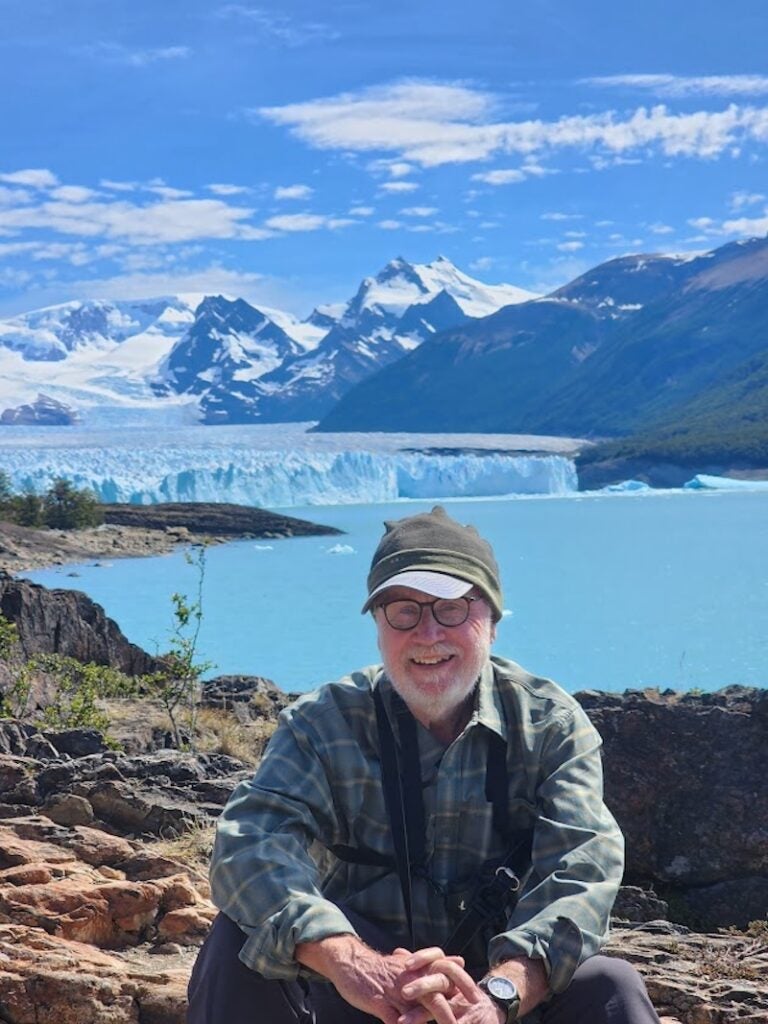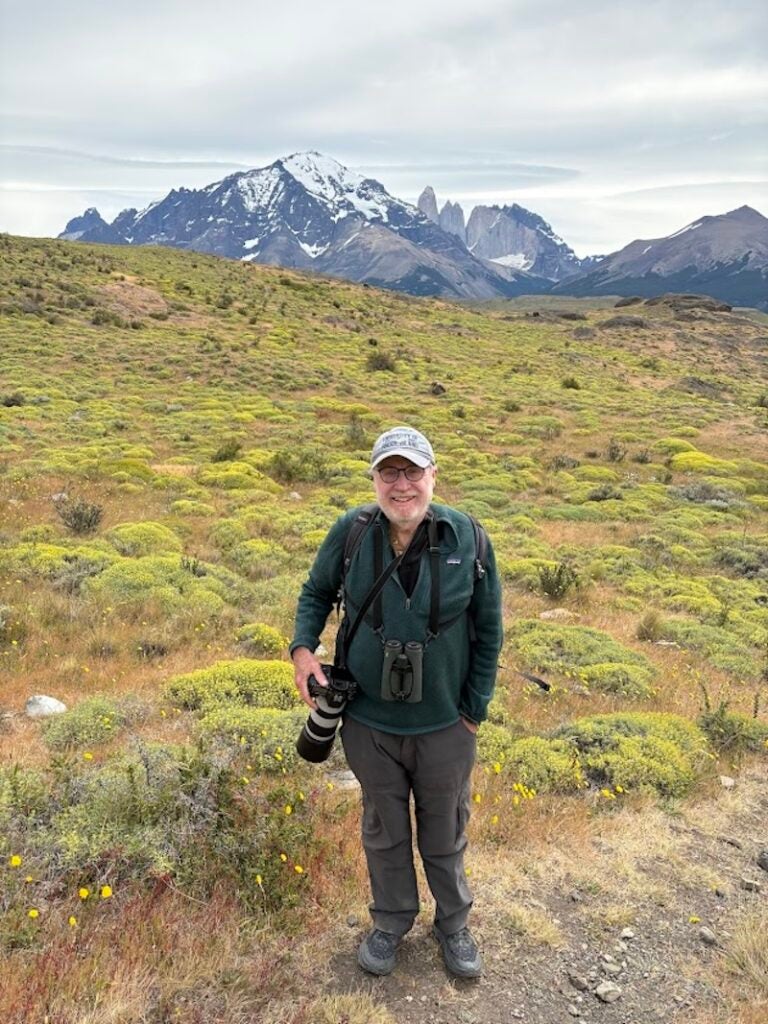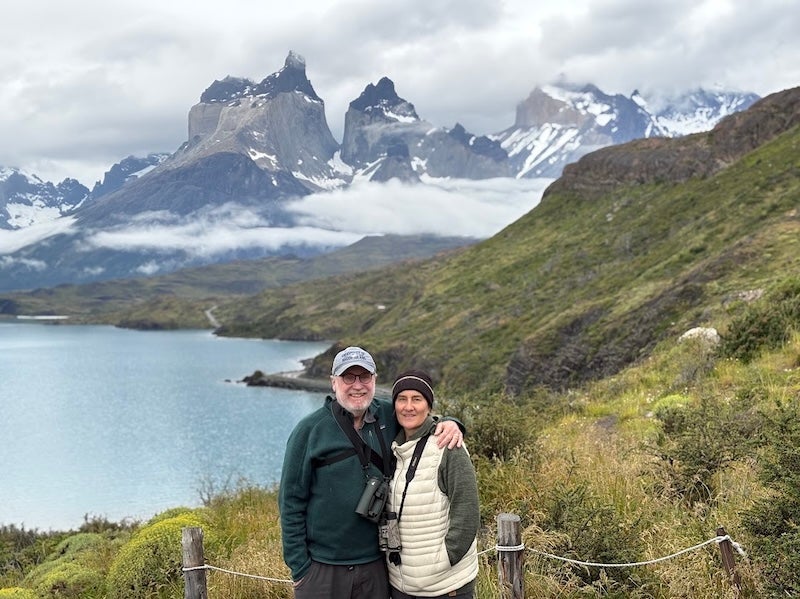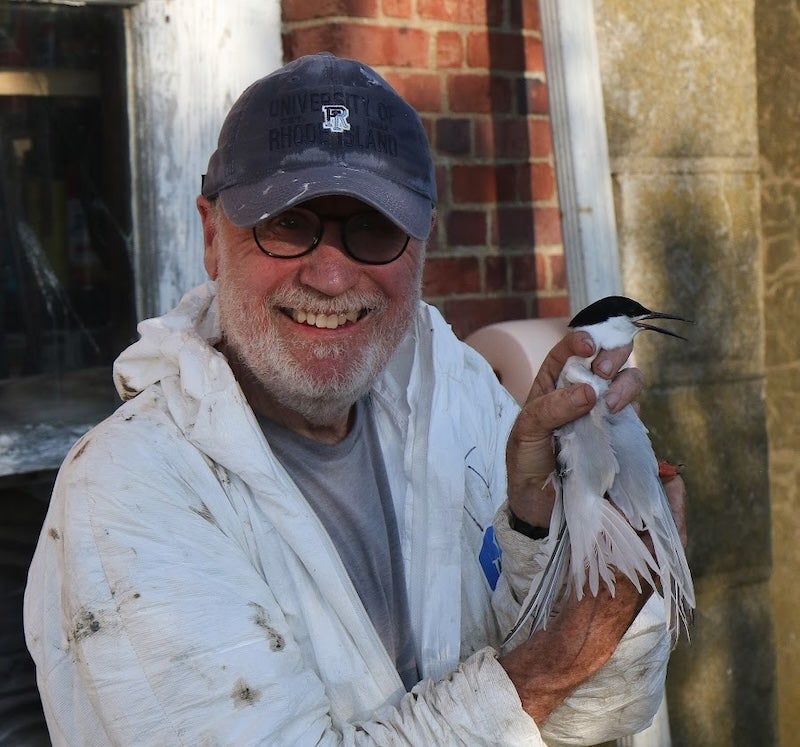Professor of Natural Resources Science (NRS) Peter Paton is retiring after more than 30 years of teaching at URI. With a strong passion for conservation and engaging his students in nature, Paton has made a lasting impact on the University and with the many students who have taken his courses. Paton started teaching at URI in 1995 and has dedicated more than three decades to getting students excited about doing wildlife research in the field. He has taught several NRS courses including Field Ornithology, Wetland Wildlife Management, and Herpetology.
Paton took an ornithology class his junior year at Lewis & Clark College and soon realized his passion for the field. “Don McKenzie was a passionate field biologist, and it was the first time I really got exposed to that,” he says of an early professor. “I thought I was going to go into health science, but I took an ornithology class and, having already done a lot of outdoor activities before, I realized I liked doing that. Don was very passionate and enjoyed life. And a lot of the students that got excited about birds were people I felt I could be good friends with.”

Conservation has always been a passion for the NRS instructor, and it shows through in the ways he has helped to inspire other students to get excited about field work and interacting with nature. “I want students to be passionate about the environment and to be able to see nature and be excited about opening up their eyes to the world around them,” he says. He emphasizes the importance of being out in nature and learning about the wildlife they observe. “People just don’t realize how many species of birds are around until they really go out and have someone point them out. If they get passionate about the species, then they’ll be interested in protecting that species.”
Paton’s background covers a range of topics within conservation and field biology, with a particular interest in shorebird conservation. While he has conducted research on avian populations across the country, he is grateful for the value Rhode Island places on conservation. “Rhode Island is a small, beautiful state with a strong conservation ethic, and we are fortunate to have access to all these national wildlife refuges, state wildlife management areas, and land trusts,” he says. “There’s a strong drive in the state to protect a lot of the lands we have access to. In these troubling times, I want to give a shoutout to all the federal and state employees doing all this conservation work.”
When asked about his favorite part of teaching, Paton responded, “My favorite thing about teaching is going out in the field with the students and getting them excited about being in the field. I love that in the fall, every Friday morning I’d be out birding with a class from 7-10am, trying to see as many birds as possible. The best thing for me is when the students get excited about it too.” He added that he takes photographs of the students while out in the field to share with them after the excursion, capturing the very moment of excitement, joy, and curiosity in their faces. “One of the things I really like to do in my classes when out in the field is taking photos and then sharing them with the students, so they have photo documentation of what they see, but also the excitement on their faces.” He notes that he also gets excited when students who have taken a class with him later get into a career or graduate program related to studying wildlife. “That’s the most fulfilling part of this – realizing that introduction with me became a passion and a career for them,” he says.

Paton has been an invaluable and beloved member of the URI community. “As well as being a skilled researcher and talented teacher, Peter is a wonderful colleague who works hard for the benefit of his co-workers and students,” says Graham Forrester, professor and Chair of NRS. “He does so quietly without seeking recognition for himself. He has been of great help to me personally over the years and will be sorely missed.”
Looking back over his career, Paton says he is especially grateful for the ability to work with students and help spark their passion for wildlife and conservation. “I’ve been very fortunate to be at URI,” he says. “The great thing about URI is that we have lots of opportunities to have faculty-led field trips with students.”
His students echo his enthusiasm. Rebeca Linhart, a former student of his and now a PhD candidate at URI, shared how Paton played a major role in her studies. “When I first returned to URI to pursue my PhD, Dr. Paton sent me a bunch of photos he had taken of me and friends during his field courses in undergrad,” she says. “It struck me that he has such a deep care for his students and is really invested in their future success. He has a real gift for teaching and mentoring future naturalists and biologists. I can comfortably say I would not be where I am today – a PhD student studying shorebirds – without Dr. Paton.”
Another student, senior Maddie Reagan, also shares her gratitude to Paton for his dedication to the sciences, the University, and most importantly, his students. She says, “The NRS department at URI will forever feel the lasting impact Dr. Paton has made over the years. His mentorship and guidance has given each student the confidence to succeed in the environmental field. I’m beyond grateful for Dr. Paton’s guidance and knowledge. I can confidently say every student in our herpetology class looked up to him as a scientist and mentor. His commitment to the sciences and to this University is truly inspiring, and URI will miss him deeply.”
~ Written by Yvonne Wingard, CELS Communications Fellow


